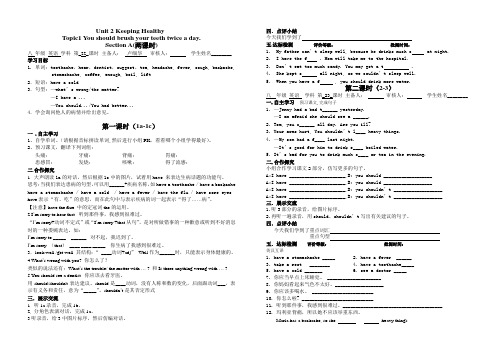Section A第2课时(导学案)
- 格式:doc
- 大小:231.50 KB
- 文档页数:3

Unit 2 Keeping HealthyTopic1 Y ou should brush your teeth twice a day.Section A(两课时)八年级英语学科第_22_课时主备人:卢细华审核人:学生姓名________学习目标1. 单词:toothache,hear,dentist,suggest,tea, headache, fever, cough, backache,stomachache, coffee, enough, boil, lift2.短语:have a cold3.句型:—what’s wrong/the matter?—I have a ...—You should.../You had better...4.学会询问他人的病情并给出意见。
第一课时(1a-1c)一 .自主学习1、自学单词。
(请根据音标拼读单词,然后进行小组PK,看看哪个小组学得最好)。
2、预习课文,翻译下列词组:头痛:牙痛:背痛:胃痛:患感冒:发烧:咳嗽:得了流感:二.合作探究1.大声朗读1a的对话,然后根据1c中的图片,试着用have 来表达生病话题的功能句。
思考:当我们表达患病的句型,可以用______+疾病名称,如have a toothache / have a backache have a stomachache / have a cold / have a fever / have the flu / have sore eyes have表示“有、吃”的意思,而在此句中与表示疾病的词一起表示“得了……病”。
【注意】have the flue 中的定冠词the的运用。
2.I’m sorry to hear that. 听到那件事,我感到很难过。
“I’m sorry+动词不定式”或“I’m sorry +that从句”,是对所做错事的一种歉意或听到不好消息时的一种委婉表达。

班级:组名:姓名:日期:2014/2/21 编制:八年级英语备课组课题:Unit 2 I’ll help to clean the city parks. Section A(2a-2c)课时:第2课时【学习目标】1.掌握重点单词: sign, notice, lonely.2.掌握重点短语: come up with, put off, hand out, call up, used to, care for.3.掌握重点句型: need to do sth. Let’s do sth.重点:could向他人提建议, 动词短语的区别,角色扮演难点:文中的复会句。
【学习准备】学生:完成预习案。
教师:编制导学案、制作多媒体课件、制作教具等。
【预习案】使用说明&学法指导:1.正确拼读P10单词并牢记;2.预习2a-2c,勾重点短语和句子并翻译;3.熟读2d对话,理解句意。
4. 15分钟独立完成。
I预习导学词汇精粹1.根据汉语意思写单词标志(n.)________ 通知(v.)__________ 孤独的(adj..)___________2. 翻译下列短语和句子1.想出_______2.推迟______3.张贴__________________4.分发____________5.打电话___________6.清洁日________________7.care for ______________ ed to______________ 9.help out_____________3. 自读、小组内互读单词和词组。
【探究案】Step1一群学生正在策划一个城市公园清洁日。
听录音,并勾出他们为告诉人们关于城市清洁日要做的事,完成2a。
(独立完成,自己核对答案,预时2分钟)Step2朗读2b中的句子,再听一遍录音,并填空,完成2b。
(独立完成,2分钟)Step3用2a和2b中的信息编写对话,完成2c。

Unit 2 What time do you go to school?Section A寄语:Time waits for no man. 时不待人【课前准备】I.英译汉1.what time2.g et up3.t ake a shower4.go to school 7. seven o’clock5. eat breakfast8. twelve twentyuallyⅡ.从 B 栏中找出A 栏问题的恰当答语。
A B( ) 1. What time do you get up ? A. She goes to school at eight o’clock.( ) 2.What time does he eat breakfast ? B. I go to school at six o’clock.( ) 3.What time does she go to school? C. He eats breakfast at seven o’clock.【课堂活动】1. 用英语读出下列时间:6:15 9:10 8:40 5:15 12:201:30 11:00 3:i8 7:00---What time is it? ---It’s…10:05 2:45 4:002.对话操练:--- What time do you usually go to school?--- I usually go to school at 7:10.替换词组:go to school, get up, eat breakfast, take a shower, go to bed用第三人称练习:--- What time does Gina usually go to school?--- She usually goes to school at 6:50.替换词组:play soccer, do one’s homework, play the guitar3.听力练习,完成1b,2a 和2b.【重点导学】1.怎样表示时间:★用基数词按钟点+ 分钟的顺序直接写出时间。



Unit 3 Could you please clean your room?Section A(3a-3c)第二课时【学习目标】1可以准确说出并默写本课重点生词、短语。
2.能提升精读文篇的能力, 尤其是根据上下文猜测与同义替换的能力。
3.倡导帮父母做家务,互相分担责任,快乐生活。
【学习重难点】理解重点单词、短语以及针对重点句型的分析。
通过文篇精读学习,掌握阅读技巧以及进行文篇结构的分析,情感的提升。
【学法指导】研读课本第19页及第116页单词表对应部分,根据导学案上的要求完成【自主学习】、【整体建构】、【小试牛刀】和【我的困惑】部分。
【自主学习】学习活动一:基础知识大联盟任务一:请自主预习单词和短语,根据句意写出单词或者短语。
1)Don’t _________(扔) the rubbish everywhere.2)My mother bought me a new _________(衬衣) yesterday.3)___________(两个都不) of us did the housework.4)His brother watched TV ___________________(一直) and never helped out.5)My father came over ____________________(一…就) I sat down in front of the TV.任务二:自主阅读精读3a文篇,完成选择题。
1.What is the best title of the passage? ( )A.Share the houseworkB. Take the dog for a walkC. People don’t like doing the houseworkD. Nancy’s mom is angry with her2.Why did the dog welcome me when I came home? ( )A.He wanted to play with me.B. He wanted me to feed him.C. He wanted a walk.D. He liked me very much.3.What did I want to do first? ( )A. Watch TVB. Do my homeworkC. Play with the dogD. Do the housework4. What did mom want me to do?( )A. Do my homeworkB. Take the dog for a walkC. Watch one show firstD. Help her do some washing5. Who cleaned the house at last? ( ) A. I B. My mom C. My dad D. We don’t know 任务四:继续精读3a,尝试翻译长句汉语以及重点语法点拨。
课题:Unit 2 How often do you exercise?第二课时(Grammar focus-3c)学习目标:1、重点单词Maybe(adv.) 大概;或许;可能;least(adv.) 最小;最少;(adj.&pron.) 最小的;最少的2、重点词组hardly ever几乎不曾;stay up熬夜;play sports进行体育活动;at least至少3、重点句式(1).——How often do you go to the movies?——你多久看一次电影?——I go to the movies maybe once a month.——我可能每月看一次。
(2) ——Do your parents play sports?——你父母进行体育活动吗?——Never. They always too busy.——从来不。
他们总是太忙。
重点难点:重点:频率副词的用法。
难点:能够用频率副词等谈论课余时间的各项活动。
导学设计:1.They often help with housework.他们经常帮助做家务。
(1) help作动词,意为“帮助”,常构成短语:help sb. with sth. 或help sb. do sth.,意为“______”。
例如:他经常帮助我学英语。
He often ______me _____English.(2)help也可作名词,意为“帮助”,这时help为______名词。
例如:你需要一些帮助吗?Do you need some ______?2.sometimes作副词,意为“有时”,多用于______。
例如:他有时上课迟到。
He sometimes ______ _____ for class.知识巩固:一、翻译下列短语1. 去看电影________________2. 在周末___________3. 几乎不; 很少_____________4. 每周五次__________5. 每月两次_______________6. 熬夜____________7. 做运动_________________ 8. 至少_____________9. 去购物_________________ 10. 看电视_____________Keys: 1.go to the movies 2. on weekends 3. hardly ever 4. five times a week5. twice a month6. stay up7. play sports8. at least9. go shopping 10.watch TV二、用所给词的适当形式填空。
学校:班级:小组:姓名:小组评价:教师评价:Unit 2 I’ll help to clean up the city parks.第一课时 Section A(1a-1c)【学习目标】1.会使用重点单词cheer,volunteer...,重点短语clean up,cheer up,give out...2.会使用“I could...”、“I hope to...”等句型,向别人提供协助。
3.能听懂、能说出“协助他人,参加社会公益活动”的相关话题。
【学习重难点】1.掌握cheer,volunteer...,clean up,cheer up,give out...的用法。
2.用重要句型向别人提供协助。
【学法指导】1.查词汇表,自学本课时新词汇。
2.朗读1b,勾画有用的表达:clean up,cheer up,give out,at the food bank3.互助学习,练习对话。
【自学互助】一.温故知新:和同伴议一议,讨论回答以下问题。
1.Do you think helping other is great?2.What will you do if you are a volunteer? Please give some examples.二.翻译以下短语。
1.清扫__________2.分发___________3.使快乐;振奋____________________4.sick children________________5.at the food bank__________________6.after-school study program______________________三.通过互助学习后,我的疑惑是_____________________________________________________________________________ 【展示互导】看图说,仔细听,认真评通过观察1a图片中你能够协助人们的方式,然后列出更多其他方式。
Unit9 can you come to my party?第二课时Section A (2d~3c)(一)自学预习在周六____________ 练习小提琴_____________ 在这里____________ 去骑自行车—去年秋天 ___________ 当他去看望你的时候____________ 我很乐意来恐怕我不能_ 逗留__________________ 在星期一的晚上___(-)导入定向Next weekend is my birthday, can you come to my birthday party?rd love to. When is it ?/where is it ?Sorry , I can't. / I'm afraid I have to ...(三)合作展示Role play 2d and answer the questionRecite 'grammar focus"Finish 3a 3b 3c(四)归纳提升*Sam isn' t leaving until next Wednesday.在英语中,not…until -是一个常见句型,表示“直到……才……" <, 在口语中,还可使用till代替until,构成not until…结构。
e. g. Don' t leave today' s work ________ tomorrow.不要把今天的事留到明天去做。
I __________________________ a st midnight.昨晚我过了午夜12点才睡。
*hangout;闲逛,逗留I often used to hang out in supermarkets...我过去经常在超市里逛个没完。
We can just ______________________ .我们可以只是闲逛一下,开开心。
Unit2 This is my sister.Section A GF-3cThis my friend Jane.These my brother.一、单项选择()1. Is she your ___? Yes, she is.A. brotherB. sisterC. brothersD. sisters ()2. That ___his brother.A. amB. isC. areD. it()3. Is Li Fang your friend ? Yes,___ is .A. hisB. herC. sheD. he()4—Is that your mother ? —_________________A. Yes, it's.B. No, it is.C. Yes, it isD. No ,it not. ()5. This is ____sister .A. IB. meC. myD. he二、按要求写出相应的词。
⑴this (反义词)______⑵these (反义词)_______⑶it (复数形式)______⑷he (对应词)_________⑸sister (对应词)_______⑹is not (缩写)______三、将下列句子变为一般疑问句,并作简要的肯定或否定的回答:1. This is Gina.______ _______ Gina?Yes, ______ __________. 2.That is his brother._____ ________ his brother?No, _______ __________. 3.He is my good friend._______ _____ _______ good friend?Yes, _____ _______.4.These are nice pictures._______ _________ nice pictures?Yes, _______ _________.5.Those are school things._____ _________ school things?No, ______ ________.参考答案课前预习is, are, Who’s, He, are, He’s, They’reThat’s=That is who’re=who are who’s=who is who’re=who are合作探究略随堂速练一、单项选择1.B2.B3.C4.C5.C二、按要求写出相应的词。